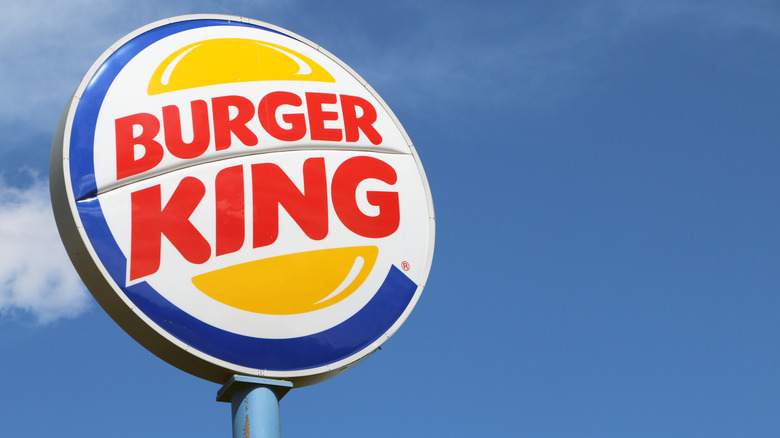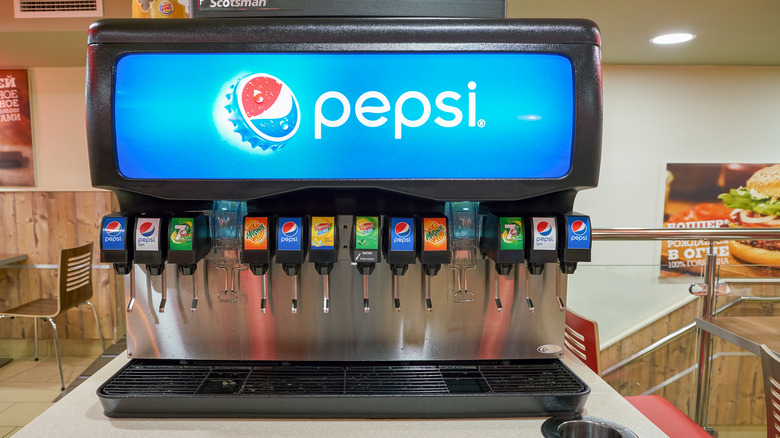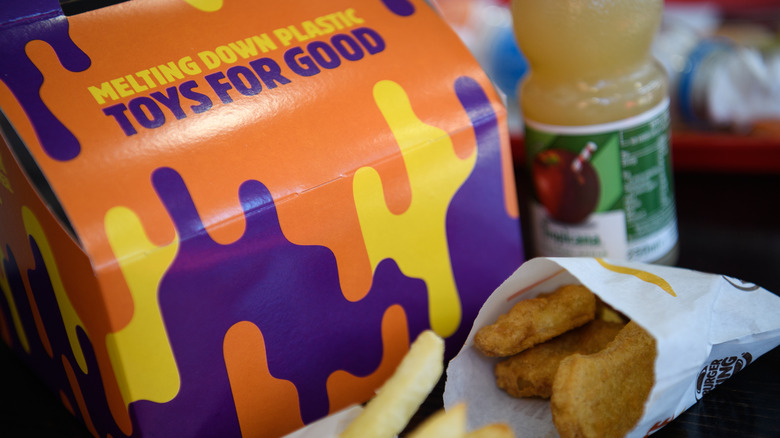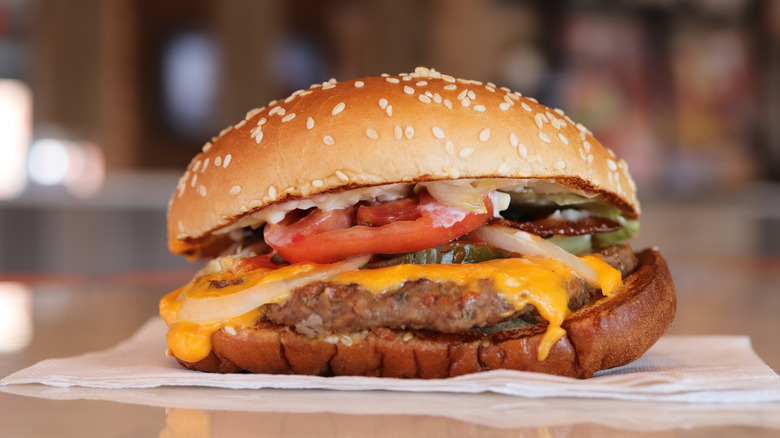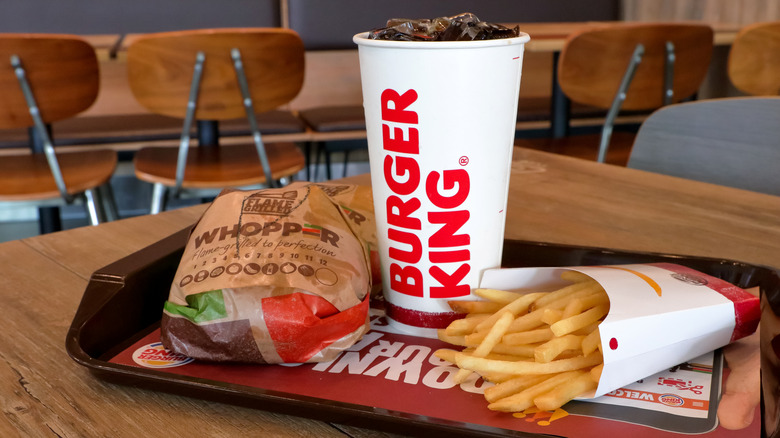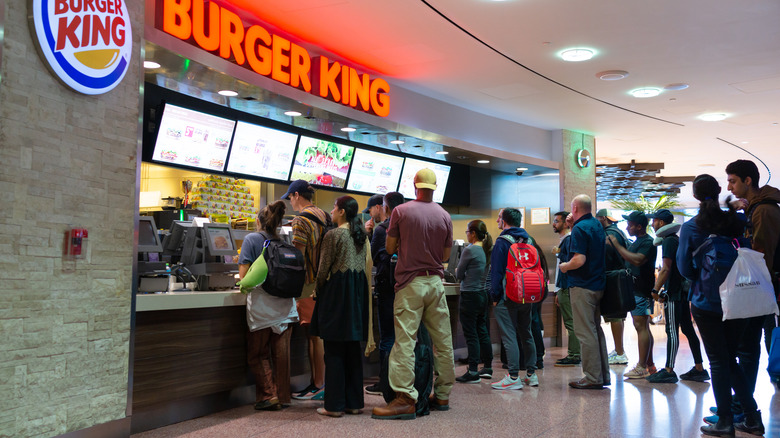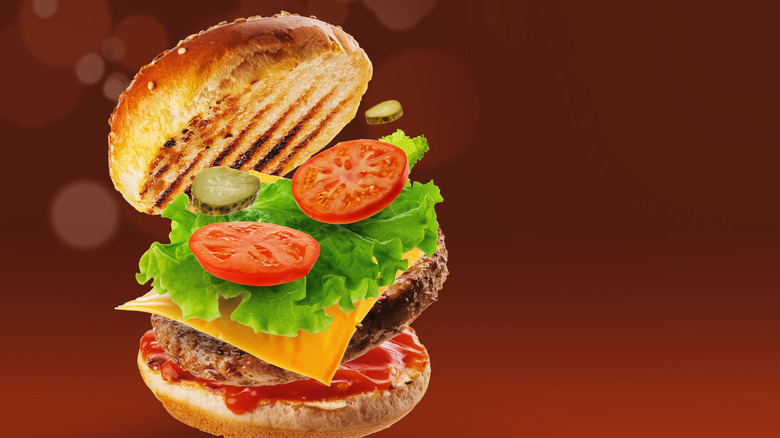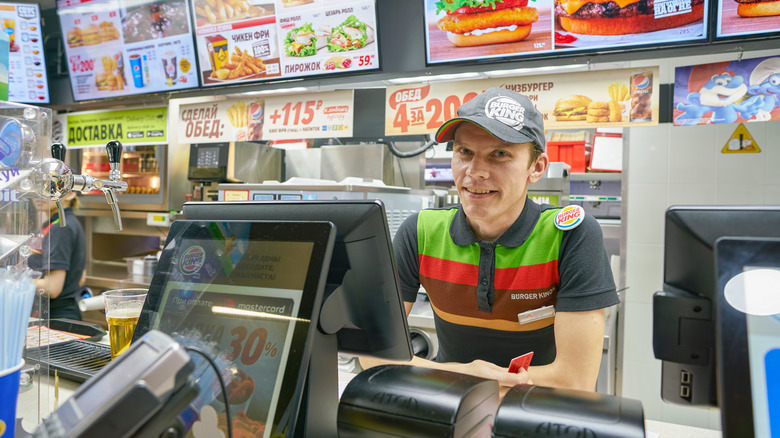We Finally Know Why Burger King Is So Cheap
Founded way back in 1953 as Insta-Burger King, Burger King released its most famous menu item, the Whopper, at just 37 cents four years later (via Business Insider). Today, the fast food giant serves 11 million customers at around 18,500 restaurants across the globe and is the second largest hamburger chain in the world after McDonalds (via Burger King). Releasing a plethora of new menu items each year, the franchise recently changed course and now markets its products as high-quality and preservative-free. In fact, Burger King has recently banned 120 ingredients from their items (via Men's Health).
So what's keeping Burger King's menu so affordable, particularly as the chain is increasingly paying attention to the quality of its products and the origins of its ingredients (via Burger King)? After all, the franchise needs to make money to stay in business. The answer: The company has very specific strategies that have allowed it to both maximize profits and pass the savings onto consumers in the form of cheap food items.
Burger King only sells profitable menu items
Just like other fast-food chains, Burger King only sells menu items that make the franchise cold, hard cash. This also means that the chain only stocks a limited inventory of ingredients that it repeatedly uses to make different meals. For example, when Burger King introduced its tacos in 2002 — a rather surprising offering for the franchise at the time — it didn't have to invest in a lot of additional ingredients since it already used lettuce, tomatoes, and cheese in other menu items (via The Takeout). Additionally, in 2021 Burger King announced that it will reduce its already limited list of menu items in the U.S. to speed up its drive-thru service and increase its sales (via CNBC).
According to Business Insider, the average mark-up for a product is 100%, but some items are sold at much more than their actual worth. The average mark-up on a restaurant soda is a massive 1,150% since it's nothing more than a mix of syrup and carbonated water. As such, it's little wonder that Burger King makes so much money on the product. Other cost-effective items for fast food restaurants — including Burger King — are ice cream and fries, since they can be made in large quantities and aren't labor-intensive.
Burger King upsells its cheap menu items
Burger King has been luring customers to its restaurants with low-priced menu items for years. In December 2021, Burger King launched its $1 Your Way menu consisting of four items priced at just $1: a Bacon Cheeseburger, a Chicken Jr. Sandwich, fries, and a soft drink (via Business Insider). The idea of constructing your meal may seem appealing, but it's not all it's cracked up to be. While savvy customers will stop at ordering a $1 burger, an item said to bring Burger King only 6 cents, most will also spend money on soft drinks and fries — the two most heavily marked-up items at Burger King.
Burger King's family-friendly and seemingly affordable Kids Meals also bring in adults who are bound to purchase more expensive items from the menu for themselves. This strategy also sets kids up as future customers of the franchise — an unhealthy relationship that often lasts a lifetime (via News Medical) and brings Burger King plenty of profits. And the franchise doesn't seem to deny this ploy: According to the Burger King website, by trying the Kids Meals, "you can find your favorite flavor early in life."
Burger King cashes in on extras
While they may appear to be a cheap addition to your main meal, side dishes such as Chicken Nuggets or Mozzarella Sticks bring in a lot of profit for Burger King. This is because sides are usually tiny and prepared in bulk, which makes them both cheap to produce and fast to serve (via The Versed). In addition, opting to add so-called staples such as French fries or a soft drink to your burger takes the franchise's profits to another level.
Burger King also makes plenty of money on an item that at a first glance may not even appear to be an extra — cheese. While the Burger King website depicts a cheesy Whopper, the burger doesn't actually come with cheese, and the addition will cost you dearly. Geoffrey James from Inc. explains, "I recently ordered a Whopper and, as usual, the order-taker asked, 'Do you want cheese with that?' Rather than answering, I asked, 'How much does the cheese cost?' The answer was '50 cents.'" Furthermore, the cheese doesn't appear on the Burger King menu as an add-on, nor as a separate item on the receipt. So unless you ask — or read this article — you'll never find out how much it actually costs.
Burger King's value meals and special deals may not be saving you as much as you think
When buying food at Burger King, most people opt for a value meal thinking that they are saving money. In fact, they are getting additional items that they may not have ordered otherwise or may not actually even want — and these are usually French fries and soda, both of which are huge money-makers for the franchise. Let's do the math. A Whopper Jr. value meal consisting of a burger, small fries, and a small drink costs $5.29. If you were to buy these three items separately, you would pay $2.19 for the Whopper Jr., $1.79 for the soft drink, and $1.79 for the small fries. Since that adds up to $5.77, you are only saving 48 cents and likely paying extra for items that you wouldn't normally have ordered (via Fast Food Menu Prices).
Fast food joints often run a variety of marketing campaigns, such as price discount coupons or two-for-one offers. While these may sound appealing, sometimes restaurants don't actually deliver on the promise. And Burger King is a case in point. In 2018, the franchise was sued for charging customers more for two Croissan'wich breakfast sandwiches with a BOGO coupon than they would otherwise have paid for a single item (via Nation's Restaurant News).
Burger King sells a lot of food
Perhaps one of the biggest reasons why Burger King is able to keep its prices so low is the sheer quantity of food sold. With thousands of restaurants worldwide, the chain's profits are all about scale. This is also where the price reductions come in — the franchise hopes that it will make money by selling a lot of discounted items. This concept is based on the principle of elasticity of demand, explains the BBC: "A firm can increase its total revenue by lowering price if demand for the product is elastic — sensitive to price. For example, if the firm lowers price 5% and quantity sold rises by 10%, then demand is elastic and total revenue will rise."
Burger King sells a lot of food not just because it's cheap, but also because it's convenient. And we aren't talking just about the number of stores and traditional delivery options here. In 2019, Burger King partnered with the food delivery giant Uber Eats to serve customers across the U.S. (via Business Wire). Also the same year, the fast food giant announced that it was working on using a GPS tracking system to deliver food to drivers stuck in traffic. After the scheme was successfully tested in Mexico City, Burger King announced that it was planning to roll out the venture in Los Angeles. It looks like we are still waiting (via Nation's Restaurant News).
Burger King uses cheap ingredients
One of the reasons why Burger King's items are so cheap is the company's ability to buy ingredients in bulk, thus ensuring huge discounts. Since nobody wants to lose a client as big as Burger King, the franchise has huge negotiation power when it comes to prices (via Restaurant Engine). And the franchise often looks to outside markets to source their ingredients, though that is sometimes due both to prices and to shortages of certain goods in the U.S. (via Query Sprout).
Burger King's sourcing practices have backfired in the past. A few years ago, Burger King was linked with a company in Brazil that grazes cattle on protected forest land (via The Guardian). The fast food franchise has since tried to redeem its reputation by using environmentally friendly packaging and preservative-free ingredients. Nevertheless, the franchise received an F in the 2021 Chain Reaction report for not taking "public actions regarding antibiotics in their supply chains" (via Consumer Reports). Looking further back, in 2013, the franchise's beef was put into question after a European meat supplier was accused of selling horse meat advertised as beef, though Burger King responded to the accusation by conducting DNA testing that apparently found no traces of horse meat in the chain's burger patties (via Popular Ask).
Burger King pays its employees low wages
Just like its competitor McDonald's, Burger King utilizes cheap labor. The average hourly wage of a worker in the fast food industry is $9.32, and Burger King pays its team members $9.73 per hour. While this is marginally higher than the industry average, if a Burger King employee puts in 40 hours per week, 52 weeks a year, their annual pay will clock in at $20,238, much lower than the median annual wage of $41,950 in the U.S. As such, it's not surprising that in 2021, employees at a Burger King outlet in Nebraska resigned en masse. On their way out, the employees left a sign outside the restaurant that read, "We all quit ... Sorry for the inconvenience" (via Independent).
In an attempt to cut their employee expenses even further, Burger King has recently started installing self-service kiosks at its branches. The unassisted digital ordering platforms let customers select and pay for their orders before even reaching the counter. The Deputy Manager at Burger King at the Manchester Airport, Wayne Tailor, said, "They've increased our productivity 10 times. We have more staff to assemble the orders, we can increase the speed of service and general productivity within the unit" (via Acrelec).
